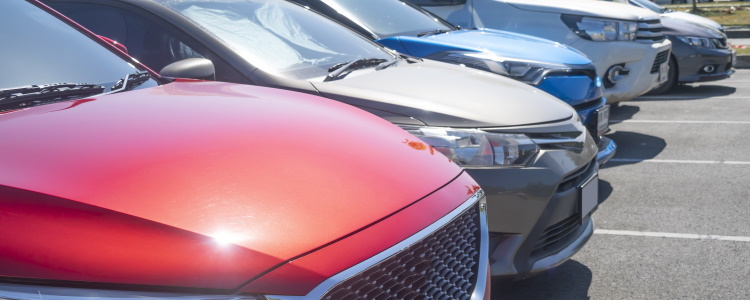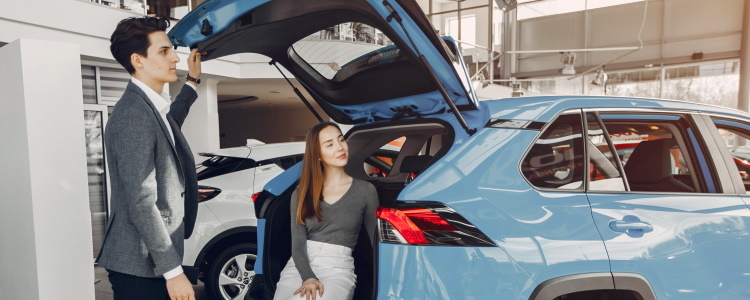Buying a new car has some benefits, but if you have bad credit, it may not be the best choice right now. Used vehicles can get a bad rap, but when you compare the costs, used cars can make more sense for bad credit borrowers.
The Real Cost of a New Car
 The sticker shock alone is enough to make some borrowers walk away from a brand-new vehicle, and who would blame them? The average new car transaction price is around $39,000. In June of 2020, the average financed amount was $34,911 for new vehicles, with the average down payment amount checking in at $4,451, according to Edmunds.
The sticker shock alone is enough to make some borrowers walk away from a brand-new vehicle, and who would blame them? The average new car transaction price is around $39,000. In June of 2020, the average financed amount was $34,911 for new vehicles, with the average down payment amount checking in at $4,451, according to Edmunds.
As car prices continue to rise, the average loan length rises, too. A longer loan means more interest charges, and they can stack up quickly if you’re a bad credit borrower. The average loan term for a new vehicle is just under 70 months, according to Experian’s State of the Auto Finance Market report from the first quarter of 2020.
In addition to a longer loan term, borrowers with less than perfect credit almost always qualify for higher interest rates than borrowers with a squeaky-clean credit history.
When you combine a long loan term, a high financed amount, and a high interest rate due to poor credit, you’re likely to end up paying more for the new car than it’s actually worth.
New Vehicles and Negative Equity
Even without a high interest rate, new vehicles have a higher chance of being stuck in a negative equity position for longer when compared to used cars. When you have bad credit, you want to remain in the most advantageous position possible to avoid damaging your credit score further.
Having negative equity means that you owe more on the car than its actual cash value (ACV), or what it’s worth. It’s a common problem for new vehicles, since they tend to lose around 20% of their value within the first year of ownership. In fact, your new car loses a good chunk of value as soon as you hit the road.
Having a large amount of negative equity can cause troubles down the line if you want to sell the vehicle or trade it in for something else. If you try to sell a car and you can only get the ACV and not the total amount you owe on the loan, you must pay that difference out of pocket to transfer ownership to someone else.
Or, you can roll over that negative equity onto another auto loan. This could lead to two large loans being squished into one, which typically leads to more time in negative equity and a long loan term, which leads to more interest charges and a higher overall cost.
Used vehicles, however, have a much lower chance of getting you stuck in a negative equity position, since they’ve probably already seen their largest drop in value before you get your hands on the wheel. And, the biggest benefit is the amount you can save right off the bat, since they’re considerably cheaper than brand-new ones.
Consider This: Every Car on the Road Is a Used Vehicle
New cars are only new while they sit and wait for a buyer at a dealership. After about five years of driving a new vehicle, it has likely only maintained around 50% of the value since you drove it off the lot. Once you drive off the dealer’s lot, your car has officially become a used one right away.
If you finance a used vehicle, you don’t need to pay for that enormous drop in value, since a well-maintained used car’s depreciation has slowed dramatically after a few years. It still declines, since deprecation never stops, but you aren’t likely to see a huge drop in value for a while unless something huge slashes the value (such as major mechanical issues).
Not only do you have a lower risk of being stuck in a negative equity position with a used vehicle, you almost always pay less.
In June of 2020, the average financed amount for a used car was $22,337, according to Edmunds. That's $12,574 less than the average for a new vehicle – that's a lot of money you can save just by choosing a used car. As a result of going used, you can opt for a shorter loan term to save money in the long run, and still have a lower monthly payment.
Bad Credit Borrowers and Used Cars
Having a manageable monthly payment and being in an equity position on your auto loan is an ideal place to be when you have bad credit. The more manageable your loan, the less you’re likely to miss payments, and the better chance you have at repairing your credit with that car loan. The more you build your credit score, the more your chances qualifying for better rates in the future become.
Additionally, you’re more likely to be considered for a used auto loan than a new one as a bad credit borrower. Most new car buyers are good credit borrowers, since the financed amount is much larger, which can make auto lenders hesitant to approve a borrower with credit challenges.
But, if you’re set on driving the latest and greatest, consider looking into a gently used vehicle in the form of a certified pre-owned (CPO) car. These vehicles are usually just coming off-lease, meaning they’re typically only a few years old, have less than 60,000 miles, and are covered under a warranty. They're also inspected by a manufactured-certified mechanic before they can be deemed a CPO.
If you’re concerned about buying a used car because you’re worried about possible repairs or breakdowns in the future, know that CPO vehicles come with more peace of mind with that warranty, and that they’ve been thoroughly inspected. They’re usually more expensive than a run-of-the-mill used car, but typically way cheaper than financing a brand-new one.
Finding a Dealership With Bad Credit Options
Now that you can see how a used car loan can benefit you as a borrower with bad credit, it's time to increase your chances of getting the loan you need. Having bad credit can mean being turned away for auto financing if you're not working with the right lender.
It's discouraging, to say the least, but there are dealerships with resources to assist bad credit borrowers. Dealers that are signed up with bad credit car lenders are called special finance dealerships. The catch? They can be hard to find sometimes.
We want to help with that. Here at Auto Credit Express, we have a nationwide network of dealers that spans the country, and we have dealerships that are signed up with bad credit lenders. To get matched to a dealer in your local area that fits your needs, fill out our free, no-obligation auto loan request form.
















